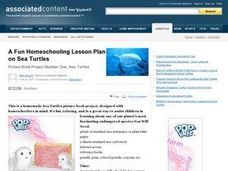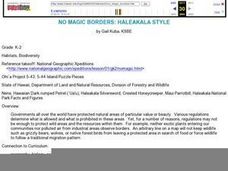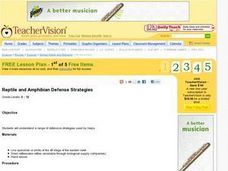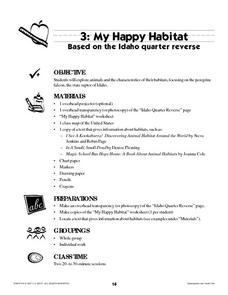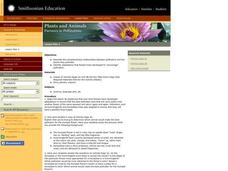Curated OER
Homeschooling Lesson: Sea Turtles
Students write down the names of common turtles and observe pictures of various types. In this sea turtles activity, students review names and features of these animals, label and draw a picture. Students research habitat, migration,...
Curated OER
How Animals Prepare for Winter
Second graders study which animal hibernate and which migrate. They observe the weather conditions related to each and complete the associated worksheets and web activity.
Curated OER
Animal Adaptations
students in groups to work on bulletin board, making a list of animal adaptations. They write an example of each body covering and find pictures of animals with these coverings. They mount pictures and label the covering. They should be...
PBS
Reading Adventure Pack: Oceans
Flotsam by David Wiesner and The Magic School Bus on the Ocean Floor by Joanna Cole, illustrated by Bruce Degen, begin a reading adventure pack focusing on oceans. With story listening and thoughtful discussion, scholars complete several...
Curated OER
Journey of the Salmon
Third graders predict salmon migration routes and explore how dams affect the salmon migration. They explore the cultural significance of salmon to the Nez Perce people and design technology to aid salmon migration.
Curated OER
Structural and Behavioral Adaptations
Students participate in a role playing lab that allows students to experience how different beak adaptations play a role in the type of food the animal can eat, therefore playing a role in the survival of the species.
Curated OER
Native American Homes
A wonderful worksheet on dwellings of Native Americans awaits your students. In this reading comprehension and American history worksheet, students answer questions about the dwellings, create pictures of them, and complete a matching...
Curated OER
No Magic Borders: Haleakala Style
Students discuss borders and boundaries. They discuss pollution and the fact that boundaries cannot stop pollution and that pollution affects even protected wildlife and plants. They participate in an activity in which they must place...
Curated OER
Reptile and Amphibian Defense Strategies
Students study the stages of the Eastern newt either by collecting a live specimen or from pictures. They note the colors of the eft stage before reading the "Eastern Newt Species Account" that shows the newt's life stages, migration,...
Curated OER
Locating Echo
Students read the book The Adventure of Echo the Bat. For this animal science lesson, students read the book and create a chart labeled "Land Feature," "Habitat," and "Food." Students fill in the table according to where the character...
Curated OER
Reading Research!
Young scholars observe the pictures in non-fiction books that focus on animals in the winter. In addition, they also listed to some read aloud books about hibernation, migration, adaptation and dormancy. Students draw pictures and write...
Curated OER
My Happy Habitat
Students observe and discuss the Idaho state quarter to begin an activity in which they define and draw different types of habitats. They discuss the habitats that the migrating Peregrine falcon, which appears on the Idaho quarter,...
Curated OER
Turtle Fun Facts
In this turtles worksheet, students read two pages of facts about turtles. Students match four kinds of turtle pictures to their habitats.
Curated OER
JUST A MATTER OF TIME
Students recognize the dynamic changes in themselves and in agriculture that have occurred through the years. They are shown pictures of a baby or students are asked to think of their little brothers or sisters or themselves in...
Curated OER
Survival
Students identify characteristics of Australia, Africa and Antarctica and compare and contrast them to each other. They work together to identify adaptations that animals have used to survive. They also practice classifying animals.
American Museum of Natural History
Fossils
Sixteen slides showcase an average day on the job for a paleontologist, Ross MacPhee. Engaging images include world maps and real-world photographs from an archeological dig in Antarctica. A brief description accompanies each slide.
Curated OER
Mazes- Wildebeests and Crocodiles
For this animal maze worksheet, students help the wildebeest cross the crocodile infested river during its annual migration. They start the star shaped maze at a picture of a wildebeest and word their way through it so that the animal...
Curated OER
Stunts & Tumbling Unit
Students, through play and use of a Hyperstudio Stack, identify animals and the way they walk, and then imitate their movements through a game. They gain motor skills through stunts and tumbling activities. This is mainly for...
Curated OER
Oil Spill Dangers
Middle schoolers analyze the effects of oil spills on our environment and develop action plans to protect animals and habitats.
Curated OER
Week 8 - Sea Life
Using a magnifier, mini marine biologists examine the barbules of a bird feather. They swirl the it into a mixture of oil and water and then re-examine the feather. After the activity, discuss how the oily feathers pose a problem to sea...
Curated OER
Embryology as Evidence of Evolution
Students observe the two major developmental pathways (protostome and deuterostome). They analyze data regarding differences in nucleotide sequences and construct a phylogenetic tree. They observe the similar evolutionary history shared...
Curated OER
Plants and Animals: Partners in Pollination
Students describe the complementary relationships between pollinators and the plants they pollinate, identify adaptations that flowers have developed to "encourage" pollination, and create and draw their own "designer" flowers.
Curated OER
Can You Do It? I Can Do It!
Students imitate the same movements that different animals would make.
Curated OER
Verterbrate Classification
Students are introduced to the broad categories of vertebrates including fish, amphibians, reptiles, birds and mammals. They identify the characteristics of each group and then view slideshows and video of example species.


